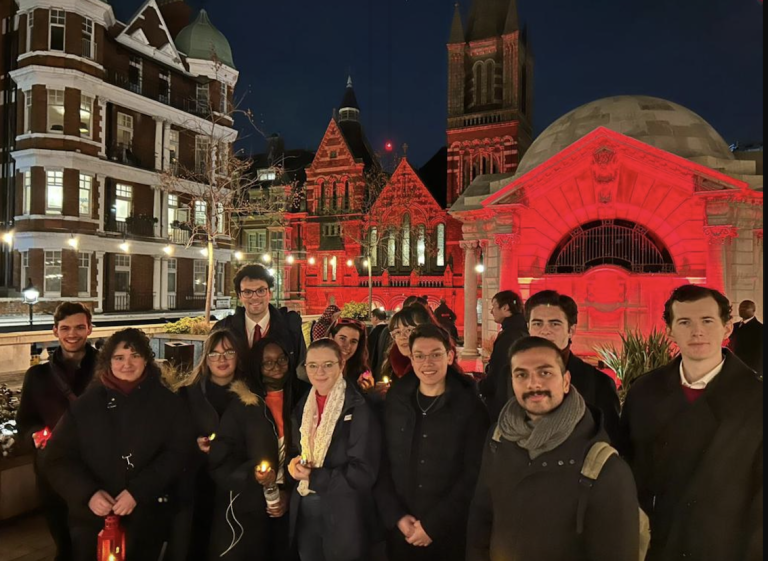Thirteen churches, the basilicas and cathedrals of France were illuminated on Wednesday in red, a color chosen to symbolize the blood shed by Christians who died for their faith. The event went largely unnoticed in the media, as was the case in Britain in July when Westminster Abbey also changed color for the day.
The initiative is organized by Aid to the Church in Need (ACN) and its aim is to raise awareness of the plight of persecuted Christians around the world. This is a sectarianism that we rarely talk about in the West. Marches are taking place in European cities to protest against anti-Semitism and Islamophobia, but who is mobilizing to defend Christians?
In its sixteenth report, published this summer, the ACN says persecution of Christians is increasing, particularly in Africa, China and Southeast Asia. The report was published before Azerbaijan launched an offensive in September against the predominantly Christian population of the Nagorno-Karabakh enclave in Azerbaijan. Described in some quarters as “ethnic cleansing,” the Azerbaijani Muslim army forced 120,000 ethnic Armenians from Nagorno-Karabakh to flee to Armenia. According to reports, Azerbaijan received military equipment from Israel before its attack.
The Western response to the plight of the Nagorno-Karabakh Christians has been generally indifferent; Some politicians in France have spoken out, such as Bruno Retailleau, Senate leader of the center-right Republican Party. He said the international community’s silent response was a “disgrace”, blaming Europe’s need for Azerbaijani gas.
Marion Maréchal, vice-president of the right-wing Reconquest party, visited Armenia at the beginning of November. At the same time, party leader Eric Zemmour, a Jew, flew to Israel to show support for the war against Hamas. “The struggle for civilization is being waged on all fronts” (6). said Maréchal, a practicing Catholic. “We have just arrived in Armenia to bring a message of support from France and Reconquest 2022 in the face of ethnic cleansing.”
In recent years, France has experienced a sharp increase in acts described as “anti-Christian”; very occasionally they make global headlines, such as the murder of Father Jacques Hamel by two Islamist extremists in his Normandy church in 2016. But most often, the hatred goes unnoticed, even in France.
One exception was last week’s desecration of the Sacré-Cœur basilica in Rouen. Father Geoffroy de la Tousche, parish priest in central Rouen, described the acts of vandalism as “utterly appalling”; this included the breaking of a statue, the theft of sacred vessels, and significant damage to the shrine.
This sacrilege occurred the same week that the Observatory on Intolerance and Discrimination against Christians in Europe (OIDAC) published a report detailing the sharp increase in what it describes as “hate crimes anti-Christians. There has been a 44 percent increase over the past 12 months; these attacks are not only physical – such as attacks or desecration of churches – but also ideological, such as “violations of freedom of religion, expression, association and conscience”.
The highest number of anti-Christian attacks in 2022 occurred in Germany, followed by Italy and then France. OIDAC said the prevalence of arson was of particular concern, up 75% from 2021. France reported 105 arson attacks last year, an increase of 45 from 2021, and these these continued in 2023; in a week in January alone in Paris three churches were burned. A man was arrested, described by police as a Ukrainian with mental health problems. Often, however, no one is apprehended for these attacks, but most are believed to be carried out by far-left radicals.
In 2021, the Ministry of the Interior published a report on crimes classified as anti-religious in France. In total, there were 1,659 such acts, of which 857 were classified as anti-Christian. 589 were registered as anti-Semitic and 213 as anti-Muslim.
Among the thirteen places of worship illuminated in red on Wednesday was the Basilica of the Sacré-Cœur in Montmartre. The basilica, construction of which began in 1875, was the result of France’s defeat by Prussia in the War of 1870. This humiliation was attributed to the moral decline of the Republic and it was hoped that a basilica would lead to a spiritual renewal.
This did not happen and it is difficult to believe that the well-intentioned illumination of the basilica in red for one evening will end the persecution of Christians in France and around the world.
(Photograph from Red Wednesday, courtesy of Aid to the Church in Need)
![]()


